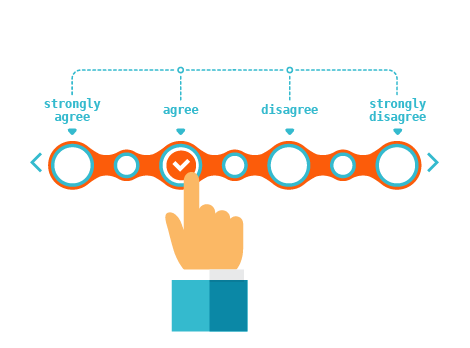Patient Surveys: How to See if Your Patients Are Truly “Very Satisfied”
The treacherous customer feedback survey has made its way into each and every one of our inboxes. You know, the one with the Likert scale that asks how satisfied you were with a brand on a scale of one to ten, or “very dissatisfied” to “very satisfied.”
There may have been a time where these were actually one of the best tools around for collecting valuable feedback on your brand’s performance and perception in the eyes of consumers, but frankly, those days are gone. We live in a world of constant digital communication with a billion ways to speak to people directly. We can now get feedback straight from the horse’s mouth, over and over in real-time.
Let’s face it, those traditional quarterly surveys most often reinforce that we’re doing a good job, and very often leave out the most important insights like how we can improve or how we can create raving fans. It’s time for a change and a bit of creativity.
Social Media Was Built for Conversations
If you’re chatting with your grandma on Facebook, why can’t you harness the same power to speak directly with your customers? Social media sets a stage for broad, open-ended continual conversations. If we’re really listening, we’ll learn what people are saying about our brand, our competitors, and our sector of the healthcare industry.
Problems can be solved faster when everyone—including patients and employees—work together to solve them. There’s no better place to do this than through social conversations. Besides, collectively solving problems is a great way to show patients you care about them.
Healthcare and Crowdsourcing
Rather than trying to make sense of 10,000 ideas, let your patients sort out what’s most meaningful to them. Tap into the online communities where your customers hang out. They’ll vote for what services they want and let you know what investments would simply be a waste of time. This way you can focus on what they want.
The Reviews Are Under Review
In today's world, most consumers have little trust for corporate messages and mainly rely on online reviews. Instead of companies saying how great they are or posting results of how great they are (a.k.a. satisfaction survey results), social media and digital mediums allow customers to speak for themselves, directly.
These public reviews cannot be manipulated by brands, so they are deemed much more authentic and reliable. In fact, data shows that when making purchases, 90% of participants are influenced by online reviews and 94% of prospective patients said reputation of facility is important in hospital selection.
A Higher Power at Work
Your brand’s online reputation isn’t only good at face value. Besides credibility, these online reviews are heavily weighted by the search engine algorithms that dictate search results. This means that if your company has positive reviews on websites like Google+, Facebook for Business, and Yelp (just to name a small few), your website will consequently rank higher and will come up more often in Google searches.
Now that's powerful feedback.
Putting it All Together
When you combine the collective powers of social media platforms, crowdsourcing, online reviews, and search engine performance into a calculated reputation management strategy, you have a stellar recipe for boosting your brand while constantly improving it at the same time.
You can use your social media to cultivate and nurture relationships with your customers, potential customers, and key players in the healthcare industry. You can lead happy customers to review sites to spread the good word.
Simultaneously, you can—and should—keep an ear on the ground to see just what people are saying about you and why. Is someone venting about poor customer service? You have a golden opportunity to swoop in, speak to the customer directly, and defuse the situation – privately or publicly for everyone to see, depending on your preferences and the circumstances.
Looking for a strong web presence, improved rankings, and real brand feedback on how to break through the healthcare haze? Call us at (407) 523-0604 for a free consultation.


